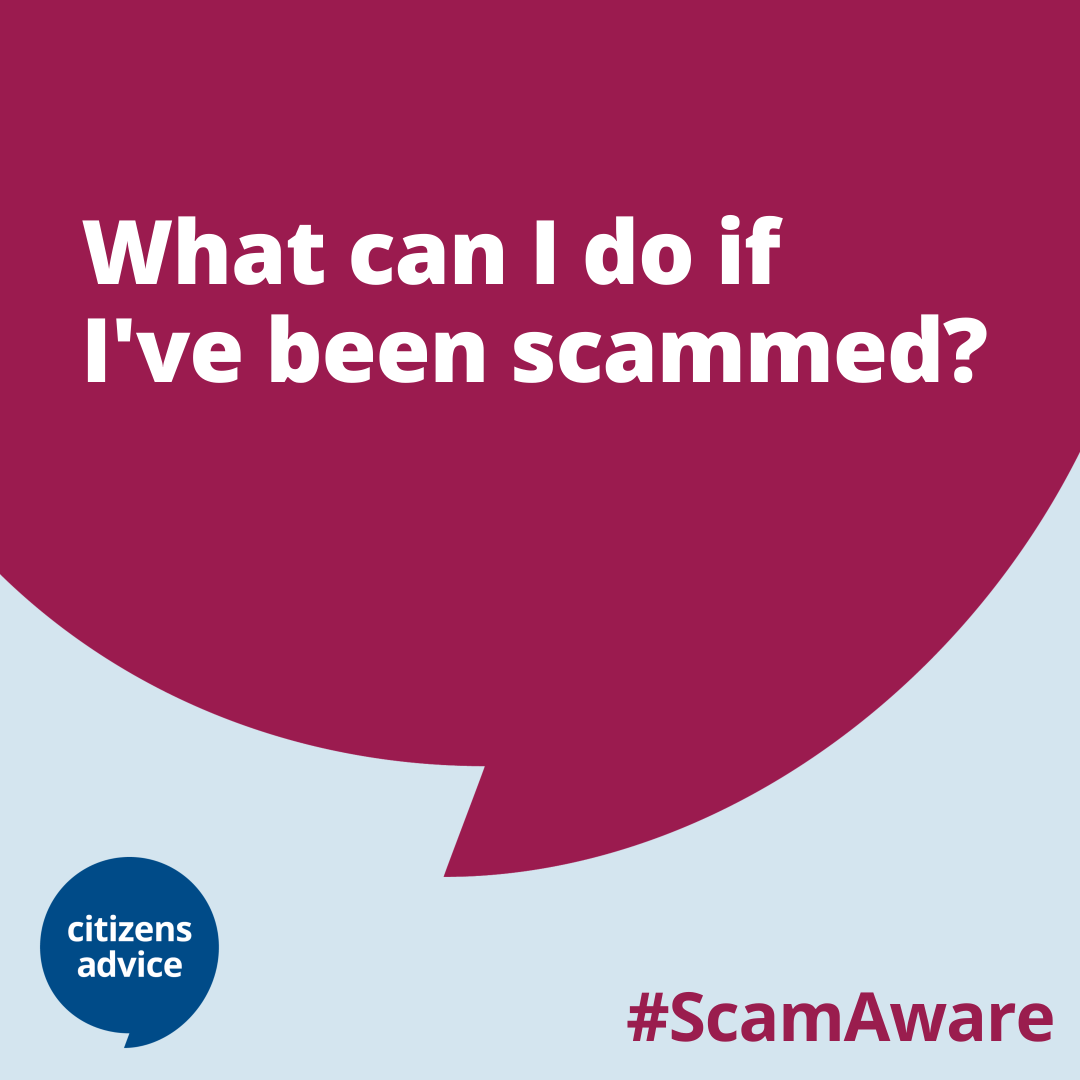Being #ScamAware
23rd
Oct

October 23, 2024
The increased financial pressure many will be facing has put more people into difficult situations, with many facing issues with debt and being unable to afford essential goods and services. We’ve seen time and again that scammers seek to exploit vulnerability, and so scammers are likely to exploit these issues, so empowering the public to protect themselves and others from scams will have heightened importance.
There are lots of different types of scams emerging. Some examples to look out for include:
- Scammers posting investment opportunities on social media that offer large profits. These profits were never shared with consumers, despite them investing more money or paying large fees
- Fraudsters using high pressure sales techniques to get vulnerable consumers to invest in their schemes
Protect yourself from investment scams
- Check for language such as ‘loophole’ or ‘guaranteed returns.’ These can be warning signs of a scam
- Don’t be rushed into signing up, even if you think you might miss out on a good deal.
- Do not provide personal details or bank details straight away.
- If you’re contacted unexpectedly by a financial business or individual, make sure you reply using the contact details on the Financial Services Register fca.org.uk/firms/financial-services-register. If you can’t find a firm on the Register, call the FCA on 0800 111 6768
- Scammers may imply that they know you have a friend that has signed up for the investment opportunity by using common names to create familiarity or trust. Don’t engage with callers using this method
- If you think someone is calling to trick you into giving them money or your personal details, hang up and call 159. This is a secure service that connects you directly with your bank. Find out if your bank uses this service at stopscamsuk.org.uk/159
- Scammers sometimes clone legitimate investment companies, using their own phone number and website details. You can visit the Financial Conduct Authority (FCA) website fca.org.uk to check if an investment opportunity has been reported as a scam and check if an investment company is registered with the FCA.
Spotting a scam
It’s important to always keep an eye out for scams. They can and do affect anyone. Here are some of the main warning signs of scams to look out for:
- It seems too good to be true – like an email saying you’ve won a competition you don’t remember entering
- Someone you don’t know contacts you unexpectedly
- You’re being urged to respond quickly so you don’t get time to think about it or talk to family and friends
- You’ve been asked to pay for something urgently or in an unusual way – for example by bank transfer or gift vouchers
- You’ve been asked to give away personal information
If you think you might be being scammed, you should get advice immediately. You can contact the Citizens Advice consumer service for help with what to do next, and report scams or suspected scams to Action Fraud.
How to protect yourself from scams
There are some simple steps people can take to help protect themselves from scams:
- Don’t be rushed into making any quick decisions. It’s okay to take your time
- If someone pressures you to send money or personal details, it’s most likely a scam. Never give money or personal details, like passwords or bank details, to anyone you don’t know or have only met online, and ask yourself why you would need to share this information.
- Before you buy anything, check the company or website you’re using. Read reviews from different websites, search for the company’s details on Companies House, and take a look at their terms and conditions
- Do not engage with cold callers or door-sellers offering too good to be true deals.
- Pay by debit or credit card. This gives you extra protection if things go wrong
- Be suspicious. Scammers can be very smart. They can appear like a trusted business or government official, have a professional website and say all the right things. Take your time to work out if this is a real organisation. Ask them for ID or contact the organisation on a number you know and trust
- Never open attachments or click on any links in messages if you’re not sure who the message came from or you don’t trust them.
- Some scams try to make you click links or open attachments that will install viruses on your device. A virus could let someone steal your personal information or take control of your phone or computer.
- Some other scams pretend to be from an organisation and try to make you click on a fake version of the website which asks for personal information.
- If you want to check your account is secure on the organisation’s official website, always open a new browser window or tab. You should type the address in the address bar. When you’re on the official website, log in directly.
- Make sure your antivirus software is up to date
- Keep your online accounts secure:
- Use a strong password for email accounts that you don’t use anywhere else. Choosing three random words is a good way to create a strong and easy to remember password. You can also add in numbers and symbols. If you’re worried about remembering lots of different passwords you can use a password manager
- Some websites let you add a second step when you log in to your account – this is known as ‘two-factor authentication’. This makes it harder for scammers to access your accounts.
- If you’re not sure about something, get advice.
What to do if you’ve been scammed
If you has been scammed, here are 3 steps you need to take:
- Protect yourself from further risks
There are things you can do to stop things getting worse. You should contact your bank immediately to let them know what’s happened. You should also change any relevant log-in details, and check for viruses if you were scammed on a computer.
- Check if you can get your money back
If you’ve lost money because of a scam, there might be ways you can get it back. Depending on the circumstances, you might be able to get your money back if you get in touch directly with the method by which you’ve paid, such as card, Paypal, Direct Debit or bank transfer.
Reporting scams helps authorities stop the criminals responsible, and protects others from being scammed. Anyone who’s been scammed should:
- Call the Citizens Advice consumer service on 0808 223 1133. We’ll pass on details of the scam to Trading Standards, and can offer further advice
- Report the scam to Action Fraud, the national reporting centre for fraud. They’ll also give them a crime reference number, which can be helpful if you need to tell your bank you’ve been scammed
It’s also important for us to all talk about our experiences with family and friends. By letting them know what’s happened they can be prepared, and together we can put a stop to scams.
Where to go for more help
- If you have been scammed, or think you’ve been scammed, you can contact the consumer service by calling 0808 223 1133.
- You can also use our online scams helper to work out if something is a scam and see the next steps to take.
- Have a read of our It pays to stay #ScamAware Leaflet.
- There’s lot of advice on the Citizens Advice website at including how to:
- You can check recent scams on Action Fraud’s website, and sign up for email alerts to find out about scams in your area at www.actionfraud.police.uk/news
Categories: Research & Campaigns



